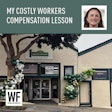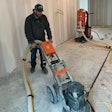
With another hurricane and tornado season behind us, and potential spring floods still on the horizon, now is a good time to revisit your recovery plans with a fresh look. From damaged buildings to wrecked inventory to disrupted supply lines, natural and man-made disasters can tear a huge hole through profitability for large and small businesses. In many cases, businesses that suffer a disaster of any sort must close their doors for good.
Plan for Recovery
Business owners must design and implement disaster recovery plans designed to mitigate harm when bad things happen. Are you taking the right actions to minimize damage if you are hit with a windstorm, a lightning strike, a flood or a power outage?
Your answer might well be "no." Too often the details of disaster planning get shortchanged for pressing matters. That's a mistake. No matter how successful your operations, everything you do can come to a halt if there's no Plan B when Plan A gets derailed.
"A bad event can take down a company forever," says Jeffrey Williams, president of Binomial International, a disaster-planning consultancy in Ogdensburg, N.Y. "That's why it's so dangerous for businesses to keep disaster planning on the back burner."
In approaching your own plan, experts counsel taking a broad view, incorporating as many "what-ifs" as possible. "There are three types of disasters," Williams says. "The first is natural. Think weather. The second is technical, when equipment fails. The third is a human error, what people do to other people. That can be sabotage or a fire." Advice from Williams: Plan for all three.
Offsite Data
Suppose you were forced out of your building right now. Maybe you are the victim of a fire, flood or windstorm. How would you continue your business? The likeliest answer would be "with great difficulty," unless you have taken measures to assure the maintenance of a certain level of customer service and sales.
"Businesses can take a number of steps to assist in getting through a crisis before the next disaster strikes," says Chris Hackett, director of policy development in the research division of Property Casualty Insurers Association of America (PCIAA). Perhaps one of the most important, he says, is determining a temporary relocation site. That might be a basement in your home or a rented room in another city. Whatever the location, it must be one where you can access your critical files. That includes your accounts receivable, so you know who owes you money, and it also includes your customer lists to protect your future revenues. Keep a computer at this location with continually updated company data.
On the topic of alternatives, make sure you have a fallback Internet network into which you can plug your devices. And have a call-forwarding plan prepared that will route incoming calls.
Finally, put together an offsite list of emergency responders. These are people you'll call to help solve the problems the disaster has caused. Include the following:
•Your attorney, accountant and insurance agent.
•Any firms that can accomplish recovery tasks such as removing water, cleaning, hauling rubbish, painting, repairing electrical and plumbing systems, replacing locks and getting computer equipment running.
•Real estate agencies that can help you set up a remote operational base while restorations continue.The remote location is one thing; having people who take the right actions is another. Identify the steps you'll need to take when disaster strikes, then assign the following tasks to some key individuals: calling employees and customers to let them know what has happened, notifying suppliers and insurance companies, and arranging for repair work by plumbers, electricians and restoration contractors.
Review Property Insurance
Do you have sufficient property insurance in place? What may be good one year may no longer be adequate several years later, so revisit your policies with a trusted advisor.
The No. 1 insurance category is, of course, property insurance that covers fire. "As it relates to fire, policies should insure your structure for 100 percent of its replacement costs," Hackett says. "If you are thinking of undertaking some renovations that will substantially add to the value of your property you should let your agent know about that. If you have not done so, the settlement under the policy will be based on information the carrier had."
Also consider your deductibles. Lower ones mean less money out of your own pocket but cost more in premiums. Higher means mean lower premiums but more out of pocket when disaster strikes. Ask yourself: If a loss happens tomorrow, would I be able to come up with the deductible?
Be prepared to prove your losses. "It's important to take inventory of the items in your business," Hackett says. "Walk through your building with a camcorder and make a video. That can be helpful with claims adjustor if you experience a loss." Store the video online and/or offsite in a safe or a bank safe deposit box.
Protect Your Revenue Stream
A disaster can interrupt sales, and that means your expected revenue stream can dry up quickly. Think about buying protection. "Business interruption insurance provides critical coverage for lost income-what your business would have earned but for the physical damage of a disaster," Hackett says.
Purchasing interruption insurance requires thorough consultation with your agent. "It's not as simple as an auto policy," Hackett says. "The carrier will ask you questions about the nature of your business, your employees, your typical income in a month and whether your business is seasonal in nature."
You might also consider "extra expenses coverage," Hackett notes. "This insurance covers the higher expenses you might incur by moving to a new location, such as higher rents, and the costs of relocation." You can also get coverage for payroll expenses. "Just because your business is shut down doesn't mean people will not expect a paycheck," Hackett says. "Paying them can be difficult if you are not taking in any income." You can purchase insurance just for the highest paid employees or for your entire staff.
Two more options: "contingent business interruption insurance" covers the lost income that results when a supplier is unable to deliver, and "extra contingency expenses insurance" covers the higher prices you might end up paying to an alternative supplier.
Rainy Day Blues
Standard property insurance policies generally cover water damage that results from pipes bursting. Not covered, however, is flooding from causes such as tidal surges, the overflow of rivers, or water flowing down from a mountain or along the ground.
"Damage from flooding can be catastrophic," says Michael Sapourn, a Satellite Beach, Fla.-based attorney who has dealt extensively with flood damage insurance and litigation. "Those who own buildings located in areas vulnerable to such events should purchase flood insurance."
"Much litigation results from the difficulty in distinguishing between water damage caused by windstorm (which is covered by standard property insurance policies) or from other causes such a tidal surge" Sapourn says. "Carriers often litigate the gray areas where windstorm ends and tidal surge begins."
Mortgage lenders will require you to buy flood insurance if you are located in a flood zone as defined by FEMA. "Businesses which have paid off their mortgage often drop flood insurance since they no longer have a lender who requires it," Sapourn says. "That's a mistake."
Finally, don't make the common mistake of being underinsured. "Don't try to save money by lowering limits. Get the coverage limits you need to protect you from a total loss," Sapourn adds.
Flood insurance policies are typically not available on a replacement cost basis, so you need to estimate what you need to rebuild. If you have an older building, you may not be able to get the policy limit you want from FEMA, so you may end up going into the private market for excess insurance.
Be sure to find a broker experienced in flood insurance. "Any broker can sell the standard flood insurance policy through the National Flood Insurance Program," Sapourn says. "While many brokers have licenses to write flood insurance, many might not write it very often. As a result inexperienced brokers may misquote your flood insurance premium based on an incorrect reading of the FEMA flood insurance rate map. This may cause problems later when FEMA sends an adjusted invoice with a far higher premium. That is especially dangerous if you have planned your budget based on the lower, incorrect quote."
Keep It Current
Once you have your recovery plan and your insurance policies in place, you are in a much better position to survive should you be hit with a disaster. But don't just toss your recovery plan in a desk file and forget about it. Advisors counsel reviewing the program annually.
"Disaster recovery planning is an evergreen issue that is never done," Williams says. "People change jobs, functions change, mobile phone numbers change. Keep revisiting your plan." You don't want to be caught without a lifeline when a crisis hits.
Disaster Quiz

Score 10 points for each "yes" answer to these 10 questions. Then total your points. If you score between 80 and 100 you are in a safe zone. Results between 60 and 80 mean you need to dust off the emergency plan. Score less than 60? Take immediate steps to get your disaster plan up to speed.
Have you. . .
1. Backed up your data regularly to an off-site location?2. Identified a remote site for relocated quarters?3. Arranged for an alternative Internet network?4. .Assigned key employees specific tasks in event of emergency?5. .Drawn up co-worker and client call lists and assigned to employees?6. Detailed your list of emergency responders?7. Selected vendors for emergency repairs?8. .Obtained property insurance for 100 percent of replacement cost?9. Maintained regular inventory; taken photos as appropriate?10. .Obtained business interruption, flood, and earthquake insurance if appropriate?-P.M.P.

































